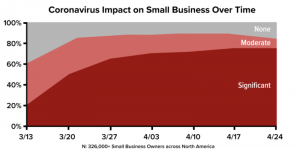During the height of the pandemic, people have been confined in their homes. Between bingeing TV series and adapting to the disruption of the lockdown to our everyday lives, at-home consumers have been consuming more content than ever.
Mikkel Høimyr, Head of Marketing at Shakr, noted that some of the most successful brands during COVID-19 had been the brands who have invested in brand building for decades because they are familiar and therefore a trustworthy choice during uncertain times.
With the pandemic disrupting a brand’s marketing strategies, organizations have started to look more closely into influencer marketing over the past year.
Høimyr reiterates that “Brands must develop strategies for long term brand building, not just short term sales activation. That means investing in high-quality video production which can be optimized across channels, like TV, OOH, and social; in long-form and bite-sized pieces.”
In a way, digital media and influencer marketing have been the bread and butter of a brand’s marketing initiatives during the pandemic. Marketers have seen how effective influencer marketing can be, especially to at-home consumers during the pandemic.
“Your use of influencers needs to be baked into the broader brand strategy,” he added.
Influencer Marketing: What brands need to know
Essentially, influencer marketing is a strategy that connects brands and taps the powerful voices of digital content creators. The goal is to drive authentic conversations about a product or service to drive awareness and engagement.
Influencer marketing provides opportunities for brands to reach and engage audiences that individuals rely on and trust. A Forbes magazine article explains several key points about influencer marketing that brands need to know in 2021:
KEY TAKEAWAY 1: The influencer and creator terminology is in flux right now.
Marketers are confident that the “influencer hype” is not going away anytime soon. Mikkel Hoymir also supported this statement and said that “Brands will become better at incorporating influencers into their overall marketing strategy.”
In fact, it has been predicted that brands may spend up to $ 15 billion on influencer marketing by 2022. The term “influencer” has also been changing, and it’s now more closely associated with monetization through brand deals and sponsorships. Some are also beginning to prefer to be called “content creators” or “creators” for those who self-identify as online creators that put more value on their creative worth and the quality of the content they deliver.
Content creators these days are more than just social media celebrities. They are also renowned photographers, performers, writers, and videographers. As such, they want to be recognized for the quality of their online content instead of their follower count.
KEY TAKEAWAY 2: Paid amplification will be critical for brands.
If you think about it, it may be sound contrary to use paid advertising for an influencer campaign since influencer marketing generally veers away from traditional advertising. However, it seems that paid amplification to create hype over an influencer’s content is becoming more critical to reach a larger audience online.
This can be attributed to effective ad targeting on social media platforms. It ensures that brands get the most of their influencer content despite tricky online algorithms and also amplifies the overall impact of their digital marketing campaign.
KEY TAKEAWAY 3: Short-form video will continue to rise.
Short-form videos have been gaining popularity over the past few years, and it’s not going to end anytime soon. Shakr Marketing Head Mikkel Hoymir noted that “People want to be entertained, and short-form video has proven to be one of the most addictive forms of entertainment, which is one of the reasons why TikTok has become so popular.”
In addition, influencer-created short-form snackable videos of all kinds will continue to appeal to consumers in 2021. As such, brands need to be prepared to produce short-form content suitable for their target audience.
KEY TAKEAWAY 4: Social e-commerce features will amplify sponsorships.
More and more social media platforms are incorporating e-commerce features into their apps. With this new shopping feature readily available to content-savvy consumers, new online shopping behaviors are also expected to emerge. As such, influencer marketing and brand sponsorship can also read a whole new level with shoppable posts and videos providing seamless transitions from influencer content to deeper e-commerce storefronts.
KEY TAKEAWAY 5: Authenticity will win the Gen Z crowd.
The Gen Z audience is becoming quite the consumer powerhouse with their reported spending estimated at about $ 100 billion. Now that the oldest members of the Gen Z crowd are entering the workforce, brands need to pay more attention to their needs and interests. This generation tends to value quality over quantity and individual expression. Most importantly, they prefer brand authenticity and companies that take a stand on social issues that they care about.
KEY TAKEAWAY 6: Taking a stand on social issues will be crucial.
Gone are the days when most brands avoid topics on sensitive political and social justice ideologies. Staying silent in 2021 can be seen by many as being complicit in the injustice that permeates in our society. Consumers today, especially millennials and Gen Z, are looking for brands that support their core values with concrete action.
Why Gen Z makes sense for influencer marketing?
Gen Z represents the largest generation of consumers with $ 29 billion in direct spending. Studies show that 93% of parents say that their Gen Z children influence their household purchases.
Gen Z is also changing the way consumers shop for products with their pragmatism. They look for deals and not brands.
For this hyper-connected generation, shopping is a way to assert their values and social activism. They are also the generation that is more comfortable around influencers since they care most about the social context of their products.
As such, influencer marketing is an excellent strategy to reach these consumers.
The Low Down on TikTok and Influencer Marketing
TikTok is now becoming the rapidly chosen social media of choice for the youngest generation.
As a result, the platform has gained a new generation of TikTok-famous influencers. This particular group of people has gotten more clout for today’s teens than other movie or TV stars right now.
Mikkel Høimyr from Shakr also reminds brands that picking the right influencers for their products needs to be based on a solid strategy and said, “You should be able to build a brand that your target audience wants to buy, again and again.”
“If you randomly pick influencers just because they are young and cool, you will just confuse your target buyers and hurt your brand,” Høimyr added.
Here are some tips on launching your influencer marketing campaign on TikTok:
TIP 1: Research your target influencers.
As stated before, brands need to do their research first and determine if influencer marketing is the right strategy to grow their target audience. If your brand believes that TikTok is the right platform, then the next thing to do is search for compatible influencers.
Of course, prior to this, brands need to understand the types of videos that their target audience is consuming on the platform. This will give them an idea about the kind of influencers that will attract their consumers. Once brands have narrowed down the influencers they want to approach, it’s time to do the necessary background check on the target influencers. Brands need to find answers to these basic questions in the search for the right influencers:
· Why are these influencers popular?
· What type of videos do these influencers share?
· Does their image portray the same kind of values as your brand?
· Would there be a potential conflict of interest once the brand engaged with these influencers?
TIP 2: Tap multi-platform creators.
Gen Z influencers are defined by interconnectivity. Innovative brands whose aim is to use influencer marketing for their overall marketing strategy will leverage multi-platform campaigns for their influencers. Brands can have influencer content circulating on TikTok, and at the same time, they can also promote products on their podcasts while also creating behind-the-scenes content for Youtube. Shakr’s Head of Marketing Mikkel Høimyr is confident that a brand’s creative strategy for influencer marketing will only get better in time. He noted that “Brands will become better at incorporating influencers into their overall marketing strategy.”
TIP 3: Find out if your current influencers are on TikTok already.
If the brand already launched an influencer marketing campaign in the past, then chances are these influencers can also be found on other platforms like Instagram, Snapchat, Youtube, and TikTok. Assuming that these influencers would fit well in your upcoming campaigns, then it wouldn’t be a bad idea to expand your existing relationship on TikTok as well.
TIP 4: Develop campaigns that encourage user participation.
It may be true that influencers are highly visible on TikTok. However, it’s a platform that’s also saturated with a lot of videos, so pure advertisements alone will not work on this platform. The key to a sustained TikTok campaign is user participation. The TikTok community engages well with quality content that resonates with the audience instead of a one-off ad about a specific brand.
TIP 5: Stay on top of the trends.
Stay on top of the trends on TikTok and know which type of influencers will bring the most value to your target audience. This endeavor requires generational awareness. Find out what their purchasing motivators are and appeal to their latest interests.
TIP 6: Disclose partnerships.
The Gen Z audience craves authenticity online. While brands can use creative content that blurs the lines between promotions and challenges, it is also equally important that these brands also disclose partnerships clearly.
Best influencer marketing campaigns on TikTok
Doritos
Doritos has always been a crowd favorite for Super Bowl ads. However, Doritos took it up a notch for last year’s campaign when they decided to collaborate with TikTok influencers to extend their Super Bowl campaign on the platform. The brand set up its own #CoolRanchDance challenge and collaborated with nine influencers who made sponsored content.
@kaileymaurer Feeling the western vibe with my #CoolRanchDance So fun! Make a duet and show me your awesome dance moves! #ad
Ralph Lauren
Fashion apparel Ralph Lauren worked with influencer Diana Silver for TikTok engagement videos. They tied their campaign just in time for the US Open Tennis Championship and used the custom hashtag #WinningRL. The custom hashtag reached around 600 million views.
@ralphlauren Are you winning at real life? Tell us how with #WinningRL and we’ll pick 3 champs
Walmart
Walmart also used the TIkTok’s clout on influencer marketing for their Black Friday campaign last year with the #DealDropDance challenge. Featuring renowned influencers on the platform, including celebrities like Terry Crews, Walmart encouraged their TikTok audience to post videos of themselves at the store expressing how Black Friday deals can make them feel like dancing a jog. The campaign ended up with consumers filming themselves as they dance around the aisles of Walmart for a chance to win a $ 100 gift card.
@terrycrews DROP IT LOW LIKE WALMART’S BLACK FRIDAY DEALS. walmart dealdropdance contest sponsored Official Rules at https://bit.ly/32HT0vW
References:
13 TikTok Influencer Marketing Case Studies To Inspire You. (2020). Retrieved 23 April 2021, from https://influencermarketinghub.com/tiktok-influencer-marketing-case-studies/
Blog: 2021 The future of influencer marketing after Covid-19 | Bobble Digital. (2021). Retrieved 23 April 2021, from https://www.bobbledigital.com/blog-2021-the-future-of-influencer-marketing-after-covid-19.html
Changing the Game: Influencer Marketing for Generation Z. (2020). Retrieved 4 April 2021, from https://influencermarketinghub.com/influencer-marketing-for-generation-z/
How to Find TikTok Influencers [+FREE TikTok Influencer Search Tool]. (2020). Retrieved 4 April 2021, from https://influencermarketinghub.com/tiktok-influencers-search-tool/
Reardon, J. (2021). 4 things to know about the future of influencer marketing | AZ Big Media. Retrieved 23 April 2021, from https://azbigmedia.com/business/4-things-to-know-about-the-future-of-influencer-marketing/
Wiley, D. (2021). Council Post: Six Influencer Marketing Trends To Watch In 2021. Retrieved 23 April 2021, from https://www.forbes.com/sites/forbesagencycouncil/2021/01/07/six-influencer-marketing-trends-to-watch-in-2021/?sh=31e1de6f7a6a
Digital & Social Articles on Business 2 Community
(58)
Report Post





